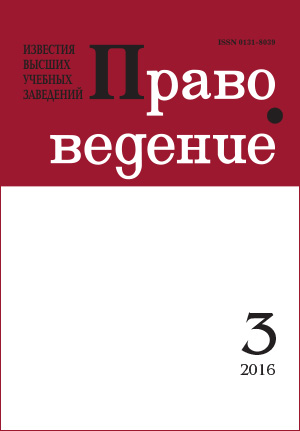Ontological domains of law
Abstract
Classical studies of conceptual and theoretical problems of law focus on the nature of the law as such, common and universal for any legal system. The main issues are addressed by the theory through the conceptual framework which represents the law in “general” logical and “universal” linguistic forms. However, the language of the law is nether neutral to what it represents, and it influences the existence of the law as a subject. The author follows postclassical views according to which the language is not only the method of denominating (defining) the subjects, but also a means of their understanding by a person. The law is presented to us in various forms which necessitate the analysis of these representations connected with our perception and understanding. Variety of images of the law is revealed through a phenomenological method and Husserl’s idea that the forms of representing the subjects always depend on their ontological differentiation. Husserl distinguishes between the ontology of tangible objects, events, states, and relations, as well as formal and apophantic subjects of the theory expressed through concepts and categories. discussions of the essence of the subject of law and its predicative forms allow making distinctions between “what” the law is and “how” it actually exists. The classical subject of the law included in the definition of the notion is a metaphysic construct outside of the real existence. differentiated ontology enables to illustrate that the “real world” and the “world of knowledge” belong to different types of realities which cannot be projected to one another. According to the author, the formal and logical analysis of the law is always opposed to the experience of law understanding where a person lives and acts. Law understanding is a method of interpretation which aims at reconstructing meanings from the perspectives of different agents. Law understanding aims at explicating the meaning of what expresses an action or experience of the person from an inner perspective. According to Heidegger, understanding is not achieved by special scientific methods which are directed at cognition and theoretical understanding; understanding is a practical aspect of the person’s life, connection with real life situations which project various possibilities for the law. The ability to understand the law is developed through communication and dialogue which help to reach a compromise for different agents. According to the phenomenological approach to the law, the legal knowledge is not only a social product, but also a product of individual values, experience and actions of the person. According to the author, the key aspect of the post-classical view is the question of what underlies the existence of the law as the “subject”: a language, thoughts, personal experience, actions, or social practice. This approach requires the law to be viewed through the perspective of the differentiated ontology where the law belongs to different types of reality.
Keywords:
ontology and epistemology of law, differentiated law ontology, phenomenological method, sign forms of the law, notion of the law, semantics and pragmatics of the law, language of the law, legal communication and dialogue, essence of the law, legal values, legal acts, subject of the law and its meaning, post-classical approach to studying the law, law understanding
Downloads
References
Downloads
Published
How to Cite
Issue
Section
License
Articles of "Pravovedenie" are open access distributed under the terms of the License Agreement with Saint Petersburg State University, which permits to the authors unrestricted distribution and self-archiving free of charge.




